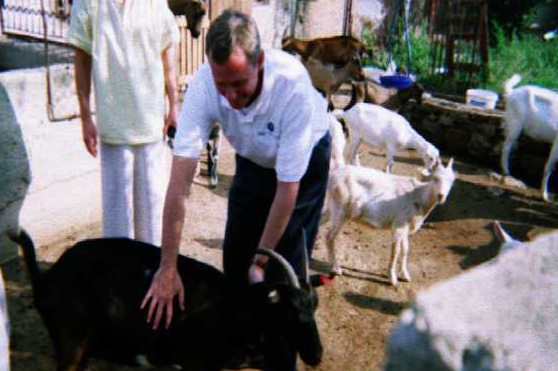
BIRMINGHAM, Ala. (BP)–Would you jump rope for a goat? How about airlift a donation in a goat’s honor? If you answered “yes,” you’re not alone.
Project MOST, part of the International Initiatives outreach of Woman’s Missionary Union focusing on the war-torn country of Croatia, has struck a chord with WMU children’s missions organizations.
Through Project MOST, people can make donations to provide goats, sheep, pigs or cows to struggling families in the European country. The family in need can receive immediate benefits from the animal (milk or meat from the offspring) while learning to farm and raise livestock.
The initial goal was $5,000 and donations were steadily coming in. But after Project MOST was featured in last February’s materials for WMU’s Girls in Action (GA) and Children in Action (CiA) organizations, Project MOST took off as girls and boys not only learned about missionary Robert Jordan* and his ministry but also how they could make a difference in Croatians’ lives.
The response was extraordinary — GA, CiA and Sunday School groups as well as individual children raised more than $250,000 in just five months (February–June 2007).
Through their Project MOST activities, the children also learned about another culture as well as ways to share the Gospel. In several instances, the children themselves accepted Christ as a result of the ministry experience. “Missions education really does propel children to make a difference in the world, and Project MOST exemplifies this,” said Jean Cullen, who oversees WMU’s International Initiatives.
Girls and boys of all ages responded in creative ways to raise money for Project MOST. One child decided to raise funds through a jump-a-thon. He and his Children in Action group called the project “Jumping Rope for a Goat” and asked for pledges from members of their church and community to buy a goat for $139.
Another child in a GA group made a scrapbook with a picture of a goat in it and divided the goat into 139 parts. She took the scrapbook wherever she went and colored in a different part of the goat every time someone gave $1. She raised enough for the entire goat.
Children made banks, sold baked goods and did chores. Some even showed their support by tasting goat milk. Others cleaned Sunday School rooms and went class-to-class in the church, involving the entire congregation.
WMU Foundation President David George said the kids “worked hard, involved everyone in their church and they believed God is who He says He is.”
Project MOST is living up to its Croatian name as the word for “bridge” by moving Croatians from poverty to self-sufficiency and economic stability, from bitterness to hope, and from cultural dogma toward a relationship with Jesus Christ.
Project MOST began in 2004 as a response to poverty in the tiny and little-known region of Dalmatia, Croatia. Civil war during the 1990s ravaged Croatia’s already-tenuous economy, rendering many of its citizens jobless, homeless and hopeless. The aftermath continues today, and Croatia’s history is marked by events “before the war” and “after the war.” Croatia remained off the radar for most people in the United States. WMU’s International Initiatives ministry, however, saw the need.
International Initiatives partnered with Jordan through a simple proposal made by Cullen — for WMU to establish a partnership that would channel monetary support toward needs identified by Jordan through a fund held by the WMU Foundation.
Jordan said his original thoughts about how Project MOST would turn out were “a lot more humble than the way it is going right now. I expected we would have a few families that we’d work with — primarily people that we could not include in our larger development projects. We met a lot of people, so many people, that we could just not help them out. This was a way, we thought originally, to reach some of those people, but it has grown to include more people than I ever imagined.”
Cullen said the strength of Project MOST — as with all WMU International Initiatives partnerships — is that it nurtures the capacity of individuals. “It is so much more than providing an animal,” she said. “With the animal comes training and education in animal husbandry, a community of colleagues, business agreements and co-ops, and regular discipleship. We are tangibly communicating that God cares about a person’s heart, mind and body. Just as evil can destroy the body and the community, God can restore it.”
Jordan believes that spiritual change will happen for people in Croatia, though it will take time. “Things move slowly here,” he said, “and there’s a lot of baggage to get rid of before they can understand the beautiful simplicity of grace. But God is at work, and I am convinced that He is working in Croatia, and that Project MOST has been part of His plan.”
For Jordan, Project MOST is about the people.
“Project MOST means to me personally, Ivo and Vesna in Drnis. Mira in Kistanje. Nine in Donji Srb. Names, faces and locations — people I consider my friends because of the work we’ve done together. It also means cards and pictures from the States. People who will never come here, who maybe a year ago didn’t know that there was a country called Croatia, … made a donation, based on faith, that the money would be used in a way to help people better their physical condition and at the same time have a chance to better their spiritual condition, that the Kingdom would benefit from their [gift] and their prayers at the time of offering.”
–30–
*Name changed to protect the security of the missionary. To learn more about other International Initiatives partnership projects through Woman’s Missionary Union, contact Jean Cullen at [email protected].
















